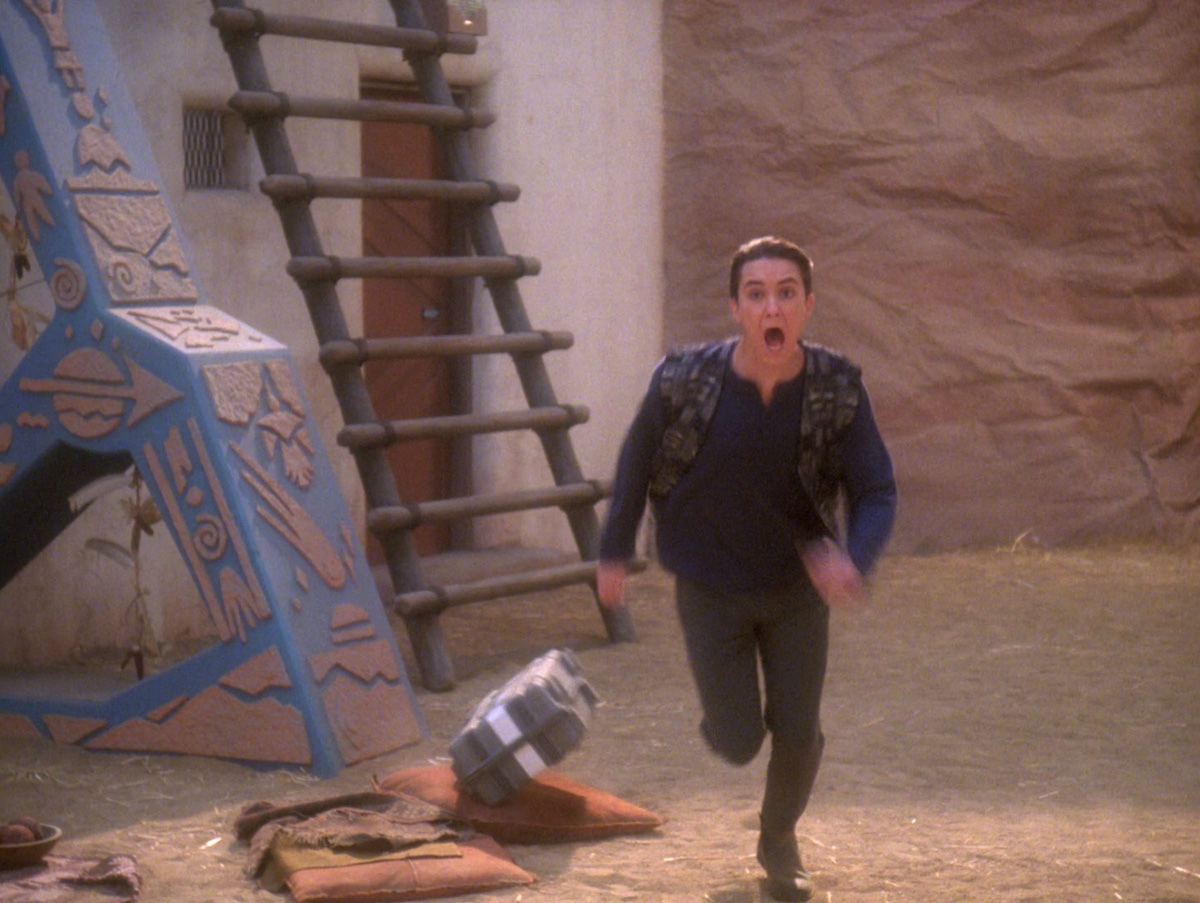“I think that’s the first time anyone’s used that particular word to describe me.”
With the end barreling towards us, Star Trek: The Next Generation takes the time to tie off three of its recurring characters: Wesley, Alexander, and Ensign Ro, starting with the former – and in the case of “Journey’s End,” it’s a weird concoction indeed. We get a visibly depressed Wesley Crusher back on the Enterprise – which is emotionally understandable, given the after-effects of “The First Duty” – and then wrap him up with Castaneda-ish shamanism, the final appearances of Jack Crusher and the Traveler, and one of the strangest pieces of social missionizing that Star Trek has yet attempted: the Planet of the Space Indians.
It’s not quite “The Paradise Syndrome,” but it’s very much a white man’s view of the broadly complex matter of Indigenous genocide in human history – convenient, indeed, that a group of Native Americans would simply vacate the premises altogether and find themselves another planet, playing out (in a way) a back-of-the-mind fantasy on the part of any number of conquering, privileged nations. “Can’t they just leave?” The meat of the drama here, then, is that we – the white man – would go to these people again, and ask them to leave… again. That they ultimately don’t is, I suppose, some kind of moral victory; but the presentation of the Dorvan colony is such tricky business that in spite of some fine performances (particularly Ned Romero as Anthwara), everything feels like a vast oversimplification mixed with “cute” outsider mysticism.
The episode is an awkward crux between two purposes: Wesley’s story, and worldbuilding for Deep Space Nine (the Maquis) and Voyager (Commander Chakotay). Screenwriter Ron Moore does the best he can with the material but the structure doesn’t adequately collide Wesley’s journey with the crisis at the colony, except incidentally. Wesley’s decision to stand with the colonists seems like a rebellious offshoot of his mood disorder, rather than a moral decision as a result of his new insights; and the ultimate “let them fight, they’ll figure it out!” wrapup from the Traveler is kinda gross in context.
And as much as I certainly allow for the idea that a 20-year-old might realize he’s been chasing the wrong star thanks to traumas in his past, and take a different course, I don’t actually buy it for Wesley. In my mind, Wesley Crusher will forever be the bratty Starfleet prodigy from the first few episodes of Star Trek: The Next Generation, most notably “Where No One Has Gone Before.” In that episode, the Traveler described him as a young Mozart, but for warp fields; younger Wesley’s passion and enthusiasm for everything Starfleet – for Star Trek itself, by extension – was the purpose and the charm of the character. In “Journey’s End,” it seems as though the struggle to find some kind of apotheosis for Wesley overwhelmed a practical sense of how the character actually works within the context of the show he is now leaving. It’s a poor valedictory for the character and the actor (and Wil Wheaton looks so disaffected with Trek at this point that I always feel as though they shouldn’t have bothered). Even though Wesley does, indeed, end up going off with the Traveler to explore time and space, his conflict with Starfleet, Picard, and his mother feels out of place and mismanaged, and he’s had not one, but three better exit episodes in “Menage a Troi,” “Final Mission,” and “The First Duty.”
And I still have no idea how he pops up at Will and Deanna’s wedding.

Blogging The Next Generation is winding down to the end, as I work my way through the episodes of Star Trek: The Next Generation on blu-ray. The final season is in stores now.
